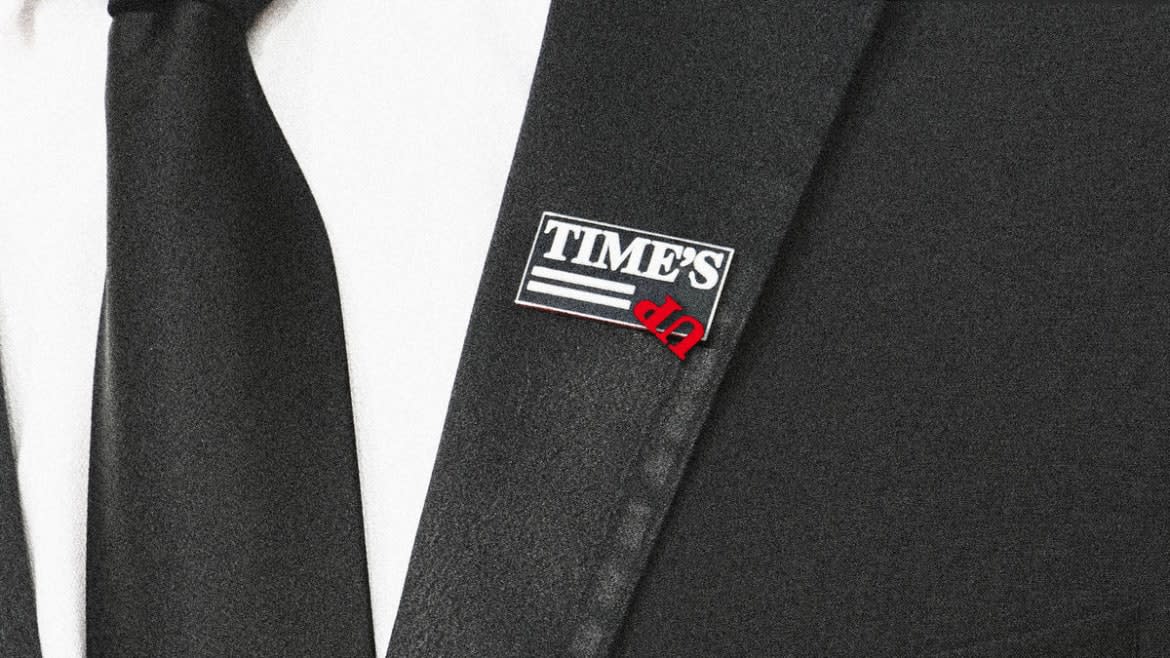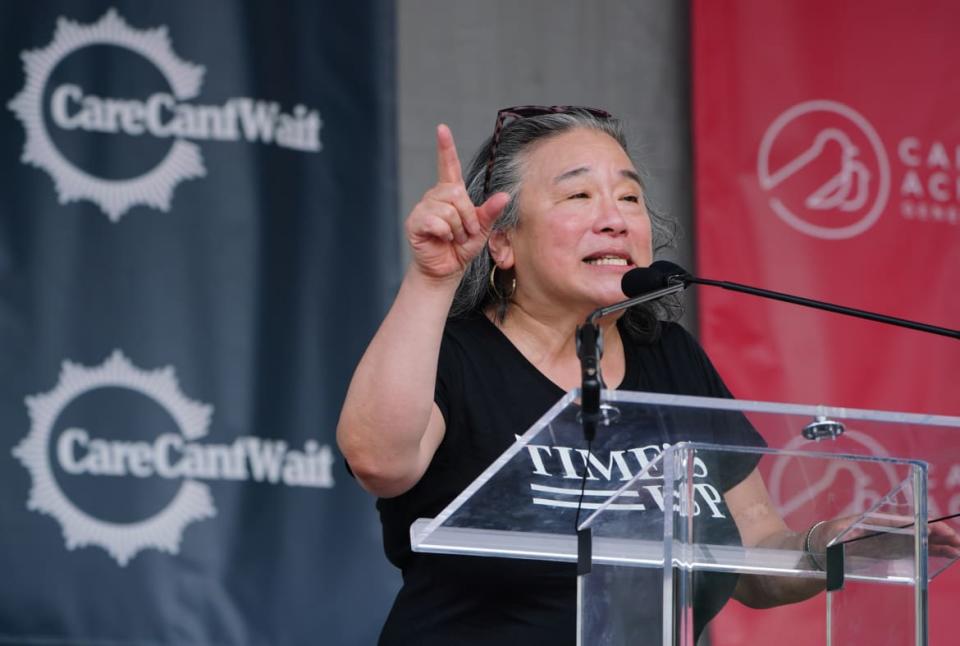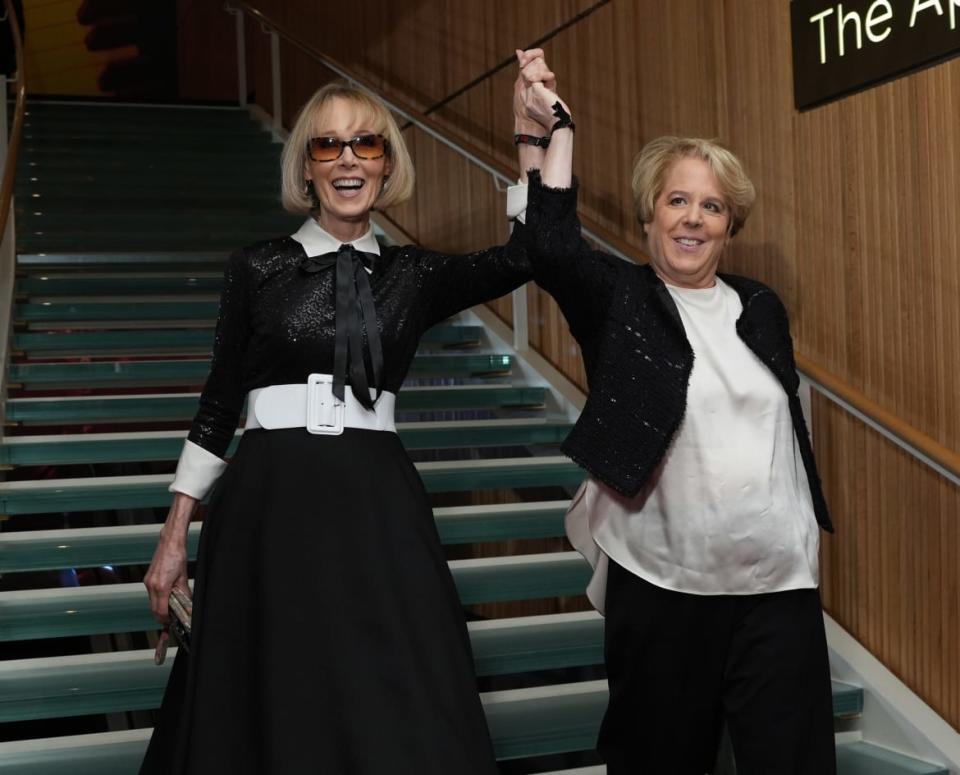The Dramatic Rise & Fall of Hollywood’s Answer to Harvey Weinstein

The overturn of Harvey Weinstein’s rape conviction on Thursday thrust the #MeToo movement back into the spotlight, sparking national conversation about what the movement has accomplished and where it’s going. But one high-profile group was absent from the conversation: Time’s Up.
The organization, launched by a coterie of Hollywood power players in the wake of revelations about Weinstein’s misbehavior, was intended to formalize the organic, largely online movement. But after its star-studded launch, the group underwent an almost cinematic fall from grace, facing complaints of elitism by staff, getting entangled in the sexual harassment allegations against New York Gov. Andrew Cuomo, and finally, suspending operations entirely.
Other organizations, like Tarana Burke’s Me Too International, have remained strong, securing steady funding and launching support programs for survivors. And the passage of legislation in at least seven states opening up a “lookback window” for lawsuits resulted in thousands of cases being filed against alleged abusers in the last two years.
Speaking hours after Weinstein’s conviction was overturned, Burke cautioned the public not to see the news as a referendum on the success of the movement, saying the decision “actually means that we have a movement.”
“Ten years ago we could not get a man like Harvey Weinstein into a courtroom and we need to be clear about that,” she said.
But the history of Time’s Up provides crucial lessons about where the movement can succeed—and where some of its pitfalls may lie.
What is Time’s Up?
Time’s Up was founded on Jan. 1, 2018, three months after The New York Times first reported on Weinstein’s predation. Conceived in a meeting of frustrated talent agents, the group made its formal debut with an open letter in the Times signed by hundreds of women in Hollywood, calling for “swift and effective change to make the entertainment industry a safe and equitable place for everyone.”
It called on actors and actresses to wear all black at awards shows to show solidarity—a call heeded by big names like Meryl Streep, Michelle Williams, and Eva Longoria. And it announced the creation of a legal defense fund, spearheaded by former Obama White House staffer Tina Tchen and famed civil rights attorney Roberta Kaplan, to support less privileged women in bringing workplace harassment cases. Within a week of its launch, the defense fund had raised nearly $15 million.

Tina Tchen speaks at a demonstration in 2021.
Who was involved?
Time’s Up called in some of the biggest names in Hollywood and beyond to advance its mission, with major donations from Shonda Rhimes, Steven Spielberg, Reese Witherspoon, and others. Hollywood power players like Oprah Winfrey dedicated their awards show acceptance speeches to raising up the organization, and Democratic lawmakers including Rep. Nancy Pelosi wore Time’s Up-branded lapel pins to Donald Trump’s State of the Union address.
In October 2018, in response to concerns that the group had grown scattered and unorganized, the group brought on Women’s National Basketball Association President Lisa Borders as CEO and president and launched subgroups dedicated to technology, health, advertising, and other areas.
When did the controversy start?
The group faced its first major scandal in February 2019, after allegations surfaced that Borders’ son had inappropriately touched a professional massage client. He denied the allegations, but Borders stepped down the next day, citing “family concerns.” Time’s Up released a statement saying it remained “steadfast in our mission to create safe, fair, and dignified work for women of all kinds.”
Eight months later, the group appointed Tchen, the former chief of staff to Michelle Obama, as CEO. Tchen, a former partner at powerhouse law firm Skadden, Arps, Slate, Meagher & Flom, previously served as an adviser to the Southern Poverty Law Center on allegations of sexual harassment and racism and worked on several other nonprofit councils and boards.
Despite her considerable civil rights chops, Tchen would not be able to head off criticism of the organization for long.
Revealed: Time’s Up Staffers Warned of Big Problems in Memo Long Before Implosion
What happened next?
Reports of dissatisfaction with the new leadership team began trickling out in the spring of 2021, when The Daily Beast broke the news of growing discomfort among staffers. Among the issues was Tchen’s alleged badmouthing of the directors of On The Record, a documentary about survivors of Russell Simmons. (The Hollywood Reporter had previously reported on conflict over TIME’s UP’s refusal to support the film.)
Other concerns included Tchen’s alleged declaration to staffers that TIME’s UP had “always been an organization of wealthy and powerful people,” and what staffers described as higher-up’s deference to Democratic leaders like Pelosi, Sen. Chuck Schumer, and—in what would become its most damning alliance—New York Gov. Andrew Cuomo.
Former Staffers Say Problems at Time’s Up Run Deeper Than Cuomo
Where does Cuomo fit into all this?
Staffers at the time told The Daily Beast that Time’s Up seemed uncomfortably cozy with the New York governor, revealing they were chastised for posting on social media about one of his chief critics, state Sen. Alessandra Biaggi. When Cuomo was accused by former aides of sexual harassment, Time’s Up broke with other women’s rights organizations that were calling for an independent investigation, instead saying his administration should investigate itself.
“The Cuomo admin conducting an investigation into itself is NOT independent,” the Sexual Harassment Working Group, an Albany-based group of harassment and assault survivors, tweeted at the time. “Please do better, @TIMESUPNOW. Victims trust you.”
The controversy exploded in August of that year, when a report from the state attorney general’s office revealed Kaplan and Tchen had consulted with Cuomo on how to respond to the allegations. According to the report, the pair even signed off on a letter disparaging one of the accusers and, according to The Washington Post, told staff to “stand down” on releasing a public statement in support of them.
The backlash to the news was instant. A group of survivors posted an open letter on Aug. 9, 2021, claiming Time’s Up abandoned the very people it was supposed to champion,” and calling on the group to remove “any board members, and staffers, who have supported perpetrators of harm, effective immediately.” Both Tchen and Kaplan were out of the organization by the end of the month.

Roberta Kaplan, with Trump accuser E. Jean Carroll.
Where is Time’s Up now?
Reeling from the Cuomo controversy, the group announced sweeping layoffs and a “major reset” in November 21. The group also disbanded its celebrity advisory board and brought on consultant Leilani M. Brown to conduct an investigation into what went wrong.
Ultimately, however, the reforms could not save Time’s Up, which announced in January 2023 that it would cease operations and transfer its remaining resources to the Time’s Up Legal Defense Fund.
“It was not an easy decision, but the board was unanimous that it’s the right decision and the most impactful way we get to move forward,” board chair Gabrielle Sulzberger told the Associated Press.
Staff Fumes, Ashley Judd Weeps as Time’s Up Pink-Slips Almost Everyone
What comes next?
The dissolution of Time’s Up did little to slow the progress of the larger #MeToo movement. Aside from Weinstein—whose conviction in Los Angeles still stands—major celebrities like R. Kelly and Danny Masterson have been convicted of sex crimes and sentenced to decades in prison.
Civil victories are also piling up. Last year, writer E. Jean Carroll won $5 million in her sexual abuse case against Donald Trump, plus a $83 million defamation case. Bills passed in New York and California in 2022 and 2023, respectively, allowed survivors to file sexual abuse cases outside the statute of limitations, leading to cases against major figures like Cuomo, New York Mayor Eric Adams, Sean “Diddy” Combs, Tommy Lee, Vin Diesel, and others. Advocates are campaigning to make permanent the New York lookback window, which expired at the end of last year.
Other anti-sexual abuse organizations, such as Me Too International, have enjoyed lasting success. Burke’s group became an official nonprofit in 2019 and boasts major institutional sponsors including CBS, Google, Gucci, and HBO, and individuals like Alyssa Milano and Reese Witherspoon. The group launched a digital initiative called Survivors Sanctuary in 2022 that offers self-paced prompts and exercises and other support for survivors.
Even in the wake of the Weinstein setback, advocates are steadfast in their determination to advance the movement.
“Today is also a reminder of the strength of our unity and our unwavering commitment to link arms and continue to do the work to ensure that we can all be safe and free from sexual violence and harm in the world of work and every place,” Mónica Ramírez, the founder of Justice for Migrant Women, said in a statement.
She added: “While this outcome—once again—is incredibly disappointing, we remain committed to building a world where women and survivors have their voices heard.”
Get the Daily Beast's biggest scoops and scandals delivered right to your inbox. Sign up now.
Stay informed and gain unlimited access to the Daily Beast's unmatched reporting. Subscribe now.


